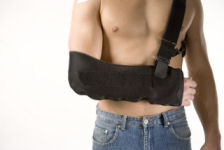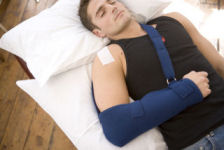Your Shoulder Surgery
[All this information, and more, is available in a small handbook available online here ]
Before your Surgery
Once your surgeon has discussed surgery with you and you have agreed the procedure, you may want to run through this checklist . If you are comfortable and confident with the surgeon and the benefits and risks of the surgery you can arrange a date for the operation.
Pre-operative Assessment:
Once a date for your surgery has been agreed, you will be contacted by the hospital for a pre-operative assessment. This may be done by telephone or in person. The nurse who does this with you will also be able to answer any other questions you might have.
You will need to have MRSA screening performed prior to admission. If you live near the hospital it can be done at the hospital, but if you are not local it can be arranged by your GP. For more information click here .
Consent Process:
Your surgeon will discuss the benefits, risks, potential complications and the recovery with you. You should also be made aware of alternative treatment options, if applicable. It is important that you ask any questions at this stage and discuss any concerns. You will be asked to sign a Consent Form, which documents the consent process.
Going to the Hospital:
 You will be asked not to have anything to eat or drink for at least six hours prior to the admission time.
You will be asked not to have anything to eat or drink for at least six hours prior to the admission time.
If you are having a general anaesthetic or sedation you will need to be driven home and should not drive for 24hours after treatment. You will also need someone to stay with you overnight after the surgery.
After the Surgery:
When you wake up following the procedure you will be wearing a sling. The type of sling may vary depending on the type of procedure undertaken. Your surgeon should have discussed this with you prior to the operation, so that you know how to cope with it. Depending on the surgery and surgeon's preferences the sling may be needed for a few days to about six weeks. Again, this will have been made clear to you prior to the surgery. Generally, for surgical repairs the sling is required for 3 to 6 weeks, depending on surgeon preference. For more details of our guidelines, please see the relevant rehabilitation protocol for your particular operation. For nformation on Living with a Shoulder Sling CLICK HERE
You may be in hospital overnight after your operation, so please bring overnight wear and toileteries. If you are having day-case surgery you should be able to go home about 4 hours after the surgery. A physiotherapist will see you in hospital to teach you the appropriate exercises .
You will need physiotherapy after the surgery and should return to your own therapist. If you don't have one a local therapist can be found here . You may want to use our Shoulder Exercise Book , which is designed to be used by you and your therapist incorporating the latest exercises from shoulder experts.

Pain
A nerve block may be used during the surgery. This means that immediately after the operation the shoulder and arm often feel completely numb. This may last for a few hours. After this the shoulder may well be sore and you will be given painkillers. These can be continued after you are discharged home. Ice packs or a cold compression wrap may also help reduce pain. For more information click here
The Wound
The surgery may be done by keyhole (arthroscopic) or open approaches.
The keyhole operation is usually done through two or three 5mm puncture wounds. There will be no stitches only small sticking plaster strips over the wounds. These should be kept dry until healed. This usually takes 5 to 7 days. You may shower with waterproof plasters (eg. Tegaderm) in the meantime. You may need to get these from a pharmacy if the hospital cannot provide them.
The open procedure is usually closed with a dissolvable stitch. If there is an exposed stitch it can be trimmed at 2-3 weeks. This can be done at your follow-up appointment or by your GP. Keep the wound dry until it is well healed. This usually takes 2 weeks. As above, you may wash with waterproof plasters.
Sleeping
Sleeping can be uncomfortable for the first few weeks, particularly if you try and lie on the operated arm. We recommend that you lie on your back or on the opposite side, as you prefer. Ordinary pillows can be used to give you comfort and support. If you are lying on your side one pillow slightly folded under your neck gives enough support for most people. A pillow folded in half supports the arm in front and a pillow tucked along your back helps to prevent you rolling onto the operated shoulder during the night. If you are lying on your back, tie a pillow tightly in the middle (a "butterfly pillow") or use a folded pillow to support your neck. Place a folded pillow under the elbow of the operated arm to support that.

Follow-Up Appointment
An appointment will be made for you to see the surgeon or specialist therapist 3-6 weeks post-operatively. This may be sent by post or given to you on discharge from hospital.
Please also remember to ensure you have post-operative physiotherapy arranged ( see above ).
Daily Activities 
For the first few weeks all activities of daily living for example feeding, dressing, cooking etc may be difficult using your un-operated arm. Be guided by your physiotherapist and surgeon. If appropriate an occupational therapist can be available to give you advice on how to do this. For more information Click Here .
Leisure Activities
Your physiotherapist and surgeon will advise you when it is safe to resume your leisure activities . This will vary according to your operation, sport and level, as well as the period required to retrain your shoulder muscles with physiotherapy. For more details of our guidelines, please see the relevant rehabilitation protocol for your particular operation.
Below is a rough guide for patients requiring a sling for 3-6 weeks:
| Swimming | Breastroke Freestyle |
6 weeks 12 weeks |
| Golf | 6-12 weeks | |
| Contact Sport | Includes horse riding, rugby, football, martial arts, racquet sports, and rock climbing | >12 weeks |
Driving
This again will vary according to your operation, sport and level, as well as the period required to retrain your shoulder muscles with physiotherapy. For more details of our guidelines, please see the relevant rehabilitation protocol for your particular operation.
Your surgeon will confirm when you may begin. It is also advisable to inform your insurance company. For more information on returning to driving CLICK HERE
Returning to Work
This will depend upon the size of your tear and your occupation. You will need to discuss this with your surgeon.
All this information, and more, is available in a small handbook available online here
If you are a patient of ours:
- Please see the Shoulder Surgery Booklet , which you will be given by Prof Funk prior to your surgery.
- Our Surgical Assistant, Linda Hallam can ring you prior to your surgery to discuss any concerns or queries you may have. Please let us know . We can also arrange for our surgeons or one of our anaesthetists to discuss any specific issues with you.
- On leaving the hospital you will be given 24 hour contact numbers for the hospital, Linda and Prof Funk.
- Linda will also contact you after discharge from hospital one or two days after the surgery. Our therapist will also contact you one week after the surgery to assess your progress.
MRSA Screening before surgery
What is MRSA?
Many people have heard of Methicillin-resistant Staphylococcus aureus (MRSA) from the TV and newspapers. It sounds frightening but it can be prevented and treated.
MRSA stands for Methicillin-Resistant Staphylococcus aureus. Staphylococcus aureus is a common type of bacteria that can live harmlessly on the skin but sometimes it can cause a number of common infections such as boils and wound infections. Methicillin is a type of penicillin. MRSA is not killed by the usual antibiotics and tends to be more common in hospital, because people are more likely to get infections when they are already unwell. MRSA can cause serious chronic wound infections which take a long time to heal and sometimes can lead to blood poisoning.
Staphylococcus aureus is quite common: around 30% of people carry the germ in their nose or on their skin (this is often referred to as being 'colonised' with the germ). However, only 6% of patients coming to hospital for surgery have MRSA. The germ is not normally a risk to healthy people and the majority of people who carry it, do not have any symptoms and aren't aware they are carrying it. Older people are more likely to be affected but only because they are more often in hospital. Gender and ethnic origin are not important.
Screening for MRSA
If we can find out who is carrying MRSA harmlessly on their skin before they come into hospital we can treat them. When people get treated for MRSA before they have their operation they recover much better and the chances of other patients becoming infected are greatly reduced.
How will I be screened for MRSA?
We can find out if you are carrying MRSA by taking a sample from the inside of your nose. This test is painless and has no side-effects.
You will usually be screened in a pre-surgery assessment clinic at the hospital you are having your surgery by a nurse. It can also be done by your GP Practice Nurse if it is difficult for you to attend the hospital. You will receive a phone call from the clinic if the result is positive and will be informed on what to do next.
What if I have MRSA?
If you are found to be carrying MRSA do not worry! You are unlikely to suffer any harm or infect anyone else. It is only a risk to family members if they themselves are expecting to have an operation in the near future. If you are worried about MRSA talk to the clinic nurse, your GP or Practice Nurse.
Unfortunately if you are carrying MRSA you will not be able to have your planned operation straight away. You will need to be treated first to protect you from getting ill after the operation and infecting other patients.
Treatment for MRSA
The clinic and your doctor will tell you what you need to do and will give you an information sheet to help you remember everything. The treatment involves washing your hair and skin with special soap and changing all your clothes, sheets and pillowcases every day for five days. In most cases this works very well.
Once you have had the treatment you will be tested again and if you are free of MRSA your surgery can go ahead.


